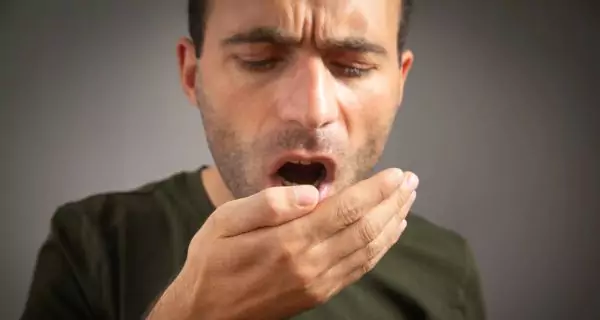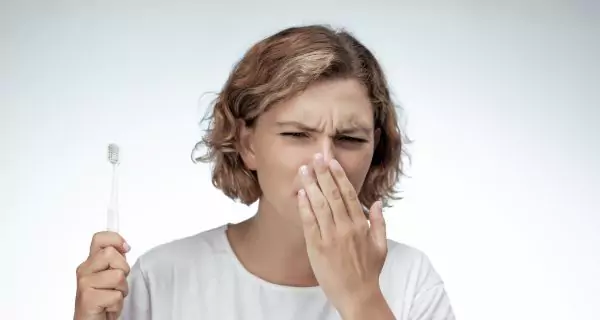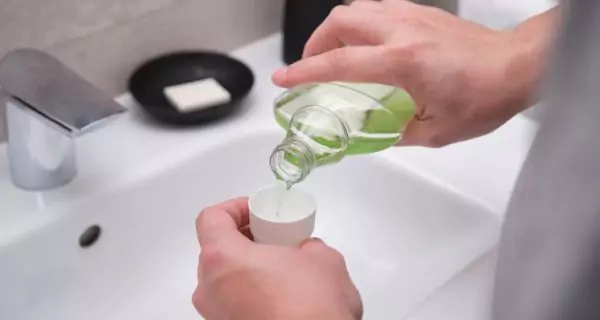Last Updated on: 11th December 2025, 10:16 am
Halitosis (bad breath) occurs when the breath smells bad in a way that others notice. It affects about 22%–50% of people worldwide. Most often, it comes from problems in the mouth, like bacteria, gum disease, or poor hygiene; but other causes, like illness, diet, or habits, also play a role. With proper care, it’s very treatable.
Halitosis is one of the main reasons people go to the dentist. Many people think it only happens because of poor oral hygiene. While this is true in many cases, it is not the only cause.
In this article, we will explain the most common reasons for bad breath and how you can prevent it. Knowing the causes will help you understand when it is time to seek professional help.
Now you can keep your breath fresh, your smile healthy, and your confidence strong in daily life.
What is halitosis?
Halitosis is the medical term for bad breath. It means an unpleasant smell from the mouth, which can be short-term (temporary) or chronic (long-lasting).
Everybody may have it sometimes (for example, in the morning), but when it continues during the day and others can sense it, it becomes a problem.
Halitosis can:
- affect daily interactions and relationships
- lower self-confidence
- indicate other oral or medical conditions
How many people have halitosis?
Studies show the prevalence of halitosis worldwide is 22%–50%.
This is because halitosis is multifactorial, meaning that it can have many causes. It is certain that at least half of all adults have had bad breath at some point in their lives.
What are the causes of halitosis?
Around 80%–90% of halitosis cases are caused by intra-oral factors, meaning that their origin is in the mouth, associated with bacteria, tongue coating, gum disease, or plaque.
The remaining 10%–20% come from outside the mouth, like systemic illness or lifestyle habits.
What mouth problems lead to bad breath?
Most cases of bad breath start in the mouth. Common oral causes include:
- poor brushing and flossing, especially not cleaning the tongue
- gum disease (gingivitis or periodontitis)
- dental cavities (tooth decay) or mouth sores
- poorly cleaned dental appliances (dentures, braces)
- tonsil stones (small stones in the tonsils)
- tongue coating: The back of the tongue is a major place where bacteria build up.
What habits can make bad breath worse?
Daily habits have a big impact on how your breath smells. Triggers include:
- foods like garlic, onion, coffee, or high-protein diets
- smoking and alcohol, which dry the mouth
- stress and lack of sleep which reduce saliva and affect digestion
- dehydration or dry mouth (e.g., from medications or sleeping with the mouth open)
What illnesses can be behind halitosis?
Sometimes, halitosis is linked to health conditions outside the mouth. These include:
- Digestive problems: reflux, ulcers, or gastrointestinal disorders.
- Metabolic diseases: diabetes, liver, or kidney problems.
- Respiratory infections: sinusitis, throat infections, or post-nasal drip.
- Medications: some drugs reduce saliva or change the mouth environment.
It is apparent that halitosis does not have a single origin. In most cases, it starts in the mouth due to poor hygiene, gum disease, or tongue coating. However, lifestyle habits and certain illnesses also play a role.
Once the causes are understood, the next step is to recognize the symptoms of halitosis, which can help detect the problem early and seek proper care.
What are the symptoms of halitosis?
Others usually notice halitosis before the person suffering from it. The most obvious symptom is a persistent unpleasant odor, but other warning signs indicate that something is wrong.
Knowing these symptoms makes it easier to identify the problem and take action before it affects confidence and daily life.
The most common symptoms include:
- Persistent bad smell: an odor that does not go away even after brushing or using mouthwash.
- Dry mouth: a lack of saliva that makes the mouth feel sticky or uncomfortable.
- Bad taste in the mouth: often metallic, sour, or bitter, especially in the morning.
- Coating on the tongue: a white or yellow layer that harbors bacteria and causes odor.
- Feeling of a dirty mouth: constant sensation that the mouth is unclean, even after hygiene.
Tip: It can be hard to detect your own bad breath. Asking someone you trust or noticing a constant bad taste in your mouth may be signs that halitosis is present.
What types of smells can bad breath have?
Not all bad breath smells the same. The type of odor can give important clues about the possible cause of halitosis:
- Rotten egg smell: usually linked to sulfur-producing bacteria in the mouth or poor oral hygiene.
- Fishy smell: may be caused by metabolic disorders such as trimethylaminuria.
- Metallic or chemical smell: often related to strict diets, fasting, or certain medications.
- Sour or bitter smell: common in people with acid reflux or digestive problems.
- Cheese-like or strong egg smell: caused by bacteria breaking down proteins in food debris.
- Rotten meat smell: suggests severe gum disease, infections, or heavy bacterial buildup.
If the smell changes often or becomes very intense, it is a good idea to visit a dentist or doctor to rule out underlying health problem.
How is halitosis diagnosed?
The first step is usually a dental exam, since most cases come from oral problems.
- Dental evaluation: The dentist will check your teeth, gums, and tongue to identify issues like cavities, gum disease, or tongue coating.
- Referral to a doctor: If no dental cause is found, you may be referred to a physician.
- Special tests: Doctors can use tools that measure gases such as volatile sulfur compounds (VSCs) and perform other medical exams to detect possible systemic causes.
A proper diagnosis is key to choosing the right treatment and avoiding unnecessary remedies.
How is halitosis treated?
Treatment depends on the cause. The first thing you have to do is improve your oral health. If that doesn’t work, visit your dentist to check what’s wrong.
What can you do at home?
Simple daily habits can greatly reduce bad breath:
- Brush your teeth and tongue at least twice a day.
- Floss daily to remove food particles between the teeth.
- Use alcohol-free antibacterial mouthwash to control bacteria.
- Clean your dentures or dental appliances thoroughly after each use.
- Drink plenty of water to prevent a dry mouth.
- Replace toothbrush every 2–3 months.
If bad breath continues despite good hygiene, professional help may be needed.
What professional treatments are available?
When home care is not enough, dentists and doctors can provide targeted treatments:
At the dentist occur
- professional cleaning to remove plaque and tartar.
- treatment of gum disease or dental cavities.
- adjustments or replacement of dental appliances that trap bacteria.
At the doctor occur
- evaluation for digestive problems (reflux, ulcers), diabetes, liver, or kidney conditions.
- diagnosis and treatment of respiratory infections such as sinusitis or post-nasal drip.
- prescription of special rinses (with zinc or chlorhexidine) or antibiotics when needed.
What home remedies help against bad breath?
You can complement your hygiene routine with natural options that refresh your breath:
Natural rinses
- water with baking soda to neutralize odors
- green or black tea for its antioxidants
- herbal infusions like mint or parsley as natural fresheners
Foods that help
- crunchy fruits and vegetables such as apples, celery, or carrots
- fresh herbs like parsley, mint, or clove
- sugar-free cinnamon gum with an antibacterial effect
What products support halitosis treatment?
In addition to hygiene and home remedies, certain products help maintain fresh breath:
- fluoride toothpastes with antibacterial action
- alcohol-free mouthwashes
- tongue scrapers or brushes
- sugar-free gum and lozenges that stimulate saliva
- breath sprays and refreshing tablets for temporary relief
With the right care, bad breath can be solved, bringing back fresh breath, comfort, and confidence.
How can you prevent halitosis?
To avoid halitosis or not suffer from it again, long-term habits and prevention strategies can help.
What healthy lifestyle habits can help?
- Eat a balanced diet rich in fruits and vegetables.
- Avoid smoking and reduce alcohol, both of which dry the mouth.
- Manage stress and get enough sleep (saliva production is affected by both).
- Stay hydrated throughout the day, not just when you feel thirsty.
How can regular check-ups help?
- Visit the dentist every 6 months for a professional cleaning.
- Schedule medical check-ups if you suffer from conditions like reflux, diabetes, or sinus problems.
Prevention is not just about keeping your mouth clean; it’s about taking care of your overall health to keep halitosis from coming back.
Can bad breath go away for good?
Yes, as bad breath is not permanent. With good oral care, regular dentist visits, and medical help when needed, you can keep your breath fresh.
The best way to control halitosis is by keeping your mouth clean, drinking enough water, and treating the real cause. This should help you feel confident again and enjoy daily life without worries.
Frequently Asked Questions
Can bad breath come from the stomach?
Does smoking always cause bad breath?
How long does it take to fix bad breath?
Can bad breath return after treatment?
Do probiotics help with bad breath?
Voice and Search (Q&A)
What foods help with bad breath?
Crunchy fruits and vegetables like apples, celery, and carrots help clean the mouth. Fresh herbs like parsley and mint also refresh the breath.
Is bad breath permanent?
No, with good oral hygiene and medical care when needed, bad breath can be managed and fresh breath restored.
What causes morning breath?
Morning breath is common because saliva flow slows down while you sleep. Bacteria build up in the mouth and create bad odors.
Share:
References
1. Barba, L., & Valerio, I. (2018). Halitosis: Basic Principles About its Origin and Treatment Narrative Review. Odovtos. International Journal of Dental Sciences, 87–100. https://doi.org/10.15517/ijds.v0i0.32881
2. Mayo Clinic. (2023, December 21). Bad breath, Symptoms and causes. Mayo Clinic. https://www.mayoclinic.org/diseases-conditions/bad-breath/symptoms-causes/syc-20350922
3. Mark, A. M. (2021). Controlling bad breath. Journal of the American Dental Association. 152(7), 582. https://doi.org/10.1016/j.adaj.2021.03.009
4. MouthHealthy. (n. d). Bad breath. ADA. https://www.mouthhealthy.org/all-topics-a-z/bad-breath
5. Newman, T. (2018, January 10). Everything you need to know about bad breath. https://www.medicalnewstoday.com/articles/166636
-
Dr. Yeidy Carolina Mesa [Author]
DDS Yeidy Carolina Mesa Passionate Dentist | Advocate for Accessible Oral Health Education Graduating from Universidad CES in 2022, I am a dedicated general dentist with a lifelong passion for helping others and making a meaningful impact in the world. My journey into dentistry began at the age of 7, inspired by my own experience with braces and overcoming a fear of the dentist. This personal journey shaped my mission to help patients conquer their own dental anxieties and embrace a healthier,...
View all posts
-
Nayibe Cubillos M. [Medical Reviewer]
Pharmaceutical Chemestry |Pharmaceutical Process Management | Pharmaceutical Care | Pharmaceutical Services Audit | Pharmaceutical Services Process Consulting | Content Project Manager | SEO Knowledge | Content Writer | Leadership | Scrum Master
View all posts
A healthcare writer with a solid background in pharmaceutical chemistry and a thorough understanding of Colombian regulatory processes and comprehensive sector management, she has significant experience coordinating and leading multidisciplina...






















